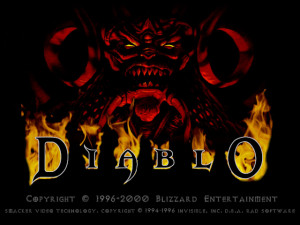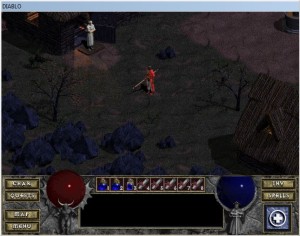Book Impressions: Stay Awhile And Listen
Posted by Rampant Coyote on January 20, 2016
 What a great age we live in! As a kid I was lucky to find a handful of books that would talk about my niche hobby, video games. Today? Not only are there plenty, but there are books devoted just to individual games. I’m not talking strategy guides or licensed novels about the really popular ones, but just books about the game. In this case, I’m talking about Stay Awhile and Listen: How Two Blizzards Unleashed Diablo and Forged a Video-Game Empire, by David L. Craddock. He’s also the author of Dungeon Hacks, which I covered several weeks ago, which is all about the history of roguelikes.
What a great age we live in! As a kid I was lucky to find a handful of books that would talk about my niche hobby, video games. Today? Not only are there plenty, but there are books devoted just to individual games. I’m not talking strategy guides or licensed novels about the really popular ones, but just books about the game. In this case, I’m talking about Stay Awhile and Listen: How Two Blizzards Unleashed Diablo and Forged a Video-Game Empire, by David L. Craddock. He’s also the author of Dungeon Hacks, which I covered several weeks ago, which is all about the history of roguelikes.
Stay Awhile and Listen bills itself as “volume 1” of a 3-volume series. I can only assume the other two are about the making of Diablo 2 and Diablo 3, respectively, as this nails the early history of both Blizzards and the development of the first Diablo. It does this through a series of interview quotes joined together with some summary / explanatory text. Like Dungeon Hacks, the book is divided into several sections. The main chapters deal with history or subjects more or less in order, sometimes jumping around between Blizzard North and Blizzard South (so, hey, you get a lot of history of the making of Warcraft and Warcraft II, also!) Then there are “side quests” which are tangential subjects that would really belong in a sidebar, if the book format had sidebars. Instead, there are hyperlinks to that section of the book, and then links back. You can read it that way, or you can read the “side quests” at the end. Then there are “bonus rounds” – additional interview text that didn’t quite fit in with the core material, but covers interesting topics on their own, like the history of Interplay and its association with Blizzard North as remembered by Brian Fargo.
Unsurprisingly, as we’re talking stuff from 20+ years ago, not everybody’s account of what happens lines up perfectly. Craddock makes note of some of the more significant differences in accounts, sharing the different views.
There are some fascinating stories here about how the game evolved, how the design decisions came about. The war over making it real-time vs. its original turn-based approach was pretty significant. How it was almost single-player only (which would have been a huge mistake). How they handled the random dungeon design, and the problems they ran into. What games inspired them. Their epic struggles to keep the lights on and make payroll during development. Even why Warcraft has such cartoony characters.
 Bottom line: I was fascinated, but I love this kind of stuff. I loved it even before I became a game dev. I love hearing the behind-the-scenes stories. And it’s from my “era” – these guys were getting into game development not too much before I did. I remember that era of the industry well. It was a wild time.
Bottom line: I was fascinated, but I love this kind of stuff. I loved it even before I became a game dev. I love hearing the behind-the-scenes stories. And it’s from my “era” – these guys were getting into game development not too much before I did. I remember that era of the industry well. It was a wild time.
And… okay. I loved Diablo. Still do, but in reading the book I found the need to reinstall the game and jump through the ridiculous hoops to get it to run on a modern computer. It’s a little painful. The game is still fun, though I think it’s safe to say it has been exceeded today in most areas, although I miss its distinctively Gothic horror/fantasy feel. But at the time, some of us had spent years arguing back and forth about how you’d do a multiplayer RPG that didn’t run from a centralized server. Diablo wasn’t perfect, but it cut through the noise of arguments by actually doing it – imperfectly, but doing it. And pretty well.
It was interesting reading this book and seeing in some ways how and why Diablo appealed to me. The developers were inspired by the same roguelikes that inspired me. They felt much the same way I do, and had to make compromises that, in retrospect, were completely reasonable.
While the book may be of interest to anyone who wants to know more about the behind-the-scenes effort that goes into making a game (especially back in the 90s, or on Diablo or Warcraft specifically) , it would be of particular interest to game developers – and nearly on the level of required reading for computer RPG developers of any stripe.
Filed Under: Books, Retro - Comments: Comments are off for this article